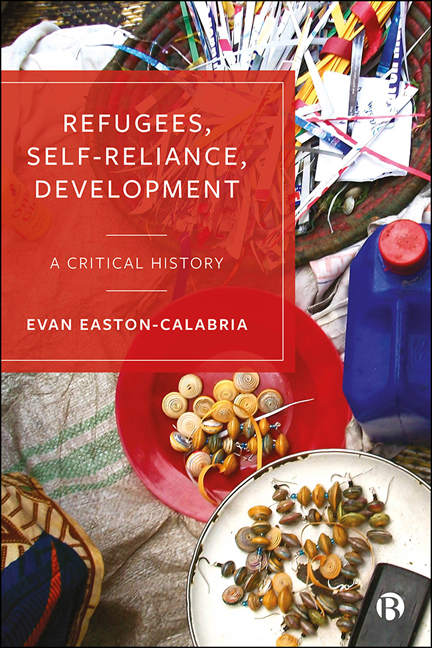Book contents
- Frontmatter
- Dedication
- Contents
- List of Figures and Tables
- Abbreviations and Acronyms
- Notes on the Author
- Acknowledgements
- 1 Introduction: Why Refugee Self-Reliance?
- 2 Self-Sufficiency out of Necessity: Refugee Self-Reliance Assistance in Interwar Greece
- 3 Socialism and Self-Reliance: Refugee Self-Reliance Assistance in Post-Colonial East Africa
- 4 Warriors of Self-Reliance: Refugee Self-Reliance Assistance in Cold War Pakistan
- 5 Dignity in Informality? Urban Refugee Self-Reliance Assistance in Kampala, Uganda
- 6 Livelihoods 2.0? Refugee Self-Reliance and the Digital Gig Economy
- 7 Conclusion
- Annex: A Note on Methods and Sources
- References
- Index
6 - Livelihoods 2.0? Refugee Self-Reliance and the Digital Gig Economy
Published online by Cambridge University Press: 12 October 2022
- Frontmatter
- Dedication
- Contents
- List of Figures and Tables
- Abbreviations and Acronyms
- Notes on the Author
- Acknowledgements
- 1 Introduction: Why Refugee Self-Reliance?
- 2 Self-Sufficiency out of Necessity: Refugee Self-Reliance Assistance in Interwar Greece
- 3 Socialism and Self-Reliance: Refugee Self-Reliance Assistance in Post-Colonial East Africa
- 4 Warriors of Self-Reliance: Refugee Self-Reliance Assistance in Cold War Pakistan
- 5 Dignity in Informality? Urban Refugee Self-Reliance Assistance in Kampala, Uganda
- 6 Livelihoods 2.0? Refugee Self-Reliance and the Digital Gig Economy
- 7 Conclusion
- Annex: A Note on Methods and Sources
- References
- Index
Summary
Enabling refugees’ resilience goes hand-in-hand with achieving durable solutions. … Better self-reliance means refugees and host communities are better able to meet their essential needs, enjoy their human rights and live with dignity.
Introduction
Evident to those of us engaged in refugee humanitarian and development work, and to many Europeans and refugees overall, 2015 marked a turning point in the wider contemporary recognition of refugee issues. The so-called ‘European refugee crisis’, wherein a record 1.3 million forcibly displaced people sought asylum in Europe in 2015 alone, has received large-scale attention and significant amounts of funding. It also arguably led to the political watershed of the 2016 New York Declaration, the Comprehensive Refugee Response Framework (CRRF), and ultimately to the 2018 Global Compact on Refugees, the world's newest instantiation of responsibilitysharing and cohesive responses to refugee flows.
This chapter has little to do with this. Instead, it is concerned with a related but parallel, still nascent movement in refugee livelihoods and selfreliance. Indeed, in many ways its focus is on changes still to come rather than what is already fully fledged. This chapter's subject is the so-called new world of work and how refugees are – and are not – involved in it. The so-called European refugee crisis is important in terms of larger political agenda-setting, which has continued the restrictionist and anti-immigrant trend arguably more present since the 1980s. The primary character in this chapter, Alaa, is also a Syrian refugee originally displaced due to the war that led so many others to flee first throughout the Middle East and then onwards to Europe. And the COVID-19 pandemic, while only peripherally present here, assuredly plays a role in the ongoing reality of digital work today.
Indeed, the nature of work is vastly changing for people around the globe. In the age of COVID-19, remote work has changed from constituting a luxury for a few to a public health strategy for the masses. Yet changes in the world of work had already started long before the pandemic. As the many reports on the future of work indicate, the rise of gig economies and innovations in technology, AI, and robotics are some drivers of this change.
- Type
- Chapter
- Information
- Refugees, Self-reliance, DevelopmentA Critical History, pp. 162 - 192Publisher: Bristol University PressPrint publication year: 2022



